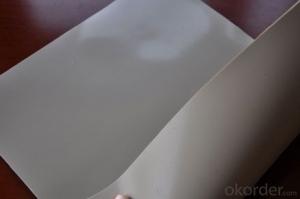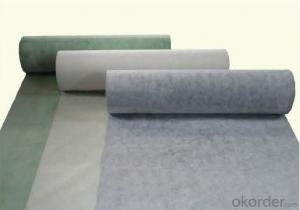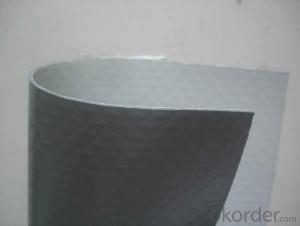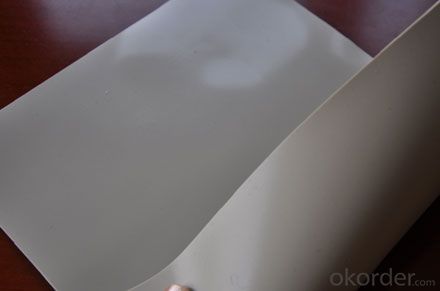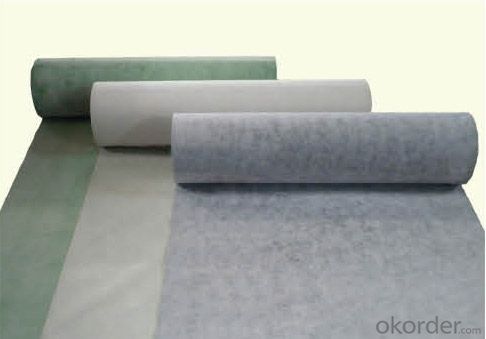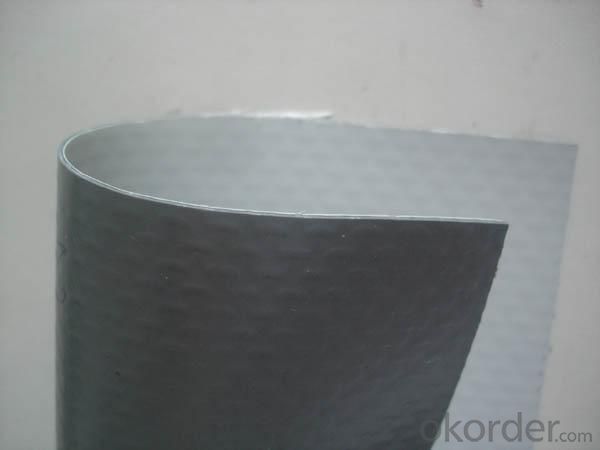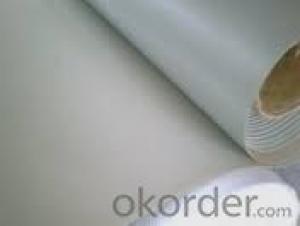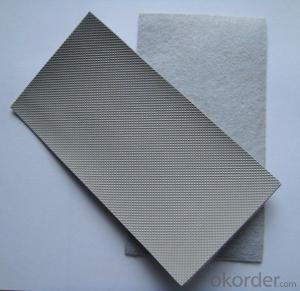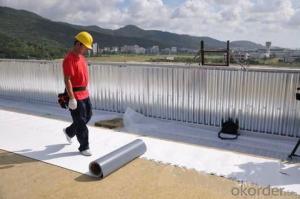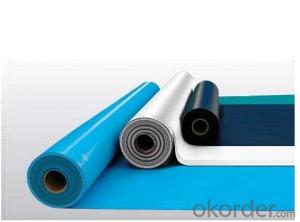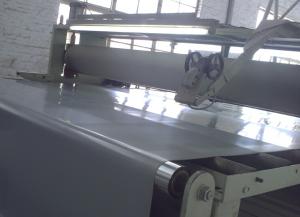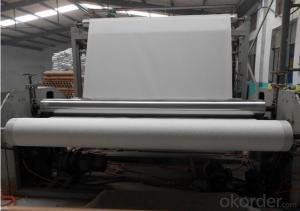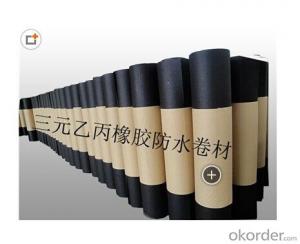PVC Laminated Roofing and Waterproofing Membrane
- Loading Port:
- China main port
- Payment Terms:
- TT OR LC
- Min Order Qty:
- 5000 m²
- Supply Capability:
- 100000 m²/month
OKorder Service Pledge
OKorder Financial Service
You Might Also Like
PVC membrane Product Description:
PVC waterproofing roofing membrane are based upon Polyvinyl Chloride Resin
with other additives to provide flexibility and stability. It gives a good performance of
anti-oxidant, absorbent of ultraviolet light, plasticizer and plastic filling agent.
Product Features:
1.High Tensile Strength
2.Waterproof,Corrosion-Resistant
3.Good Low Tempreture resistance
4.High Barrier Property
PVC membrane Product Specification:
Material: PE
Weight: 45-350g/m2
Thickness: 3mm
Style: Plain
Coated Type:PE Laminated
FAQ of PVC Waterproofing Membrane
a.Can we get some samples before place order?
Answer: We can send the free samples to you by freight collect.
b.How many years can your PVC membrane guarantee?
Answer: We will guarantee the quality for 5 years at least.
c.Which countries you ever export the product?
Answer: We export the PVC membrane to South Africa, Middle east and even European countries.
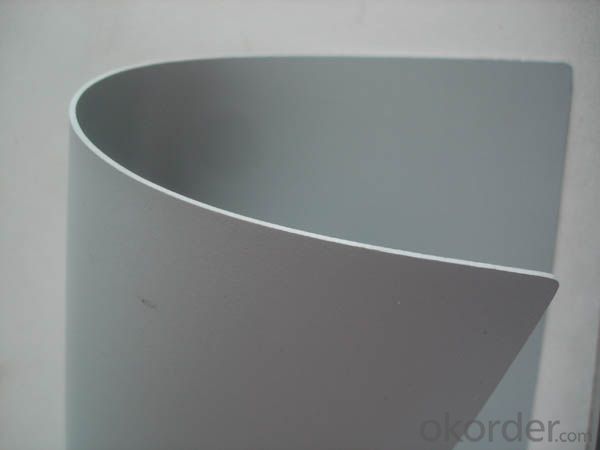
- Q: Can a waterproofing membrane be used for solar panel installations?
- Indeed, the utilization of a waterproofing membrane in solar panel installations is not only possible but highly recommended. It is common practice to incorporate a waterproofing membrane into the installation process in order to safeguard the roof or other surfaces beneath the solar panels from water-related harm. The primary function of a waterproofing membrane is to serve as a barrier, preventing water infiltration into the underlying structure. This, in turn, ensures the integrity and security of the solar panel installation, which is of utmost significance considering their typical placement on rooftops, where they are exposed to various weather conditions. By incorporating a waterproofing membrane, the longevity of the solar panels is prolonged, and any potential issues arising from water are effectively mitigated, thus preserving their optimal performance.
- Q: Can a waterproofing membrane be applied on any surface?
- No, a waterproofing membrane cannot be applied on any surface. It is important to assess the suitability of the surface before applying a waterproofing membrane. The surface should be clean, structurally sound, and free from any contaminants that could hinder the adhesion of the membrane. Additionally, certain surfaces may require specific preparation or priming before the membrane can be applied effectively.
- Q: Are waterproofing membranes resistant to earthquake-induced water pressure?
- Waterproofing membranes may offer some level of resistance against water pressure caused by earthquakes; however, their effectiveness may vary depending on the specific membrane and the magnitude of the earthquake. The primary purpose of waterproofing membranes is to create a barrier that prevents water infiltration and protects the structure from water damage. However, they are not explicitly engineered to withstand the pressure exerted during earthquakes. During seismic activity, the ground undergoes significant shaking and movement, resulting in increased water pressure in the surrounding soil and groundwater. This heightened pressure can potentially breach the waterproofing membrane, compromising its efficacy. To enhance the resistance of waterproofing membranes to earthquake-induced water pressure, additional measures may be necessary. These measures can involve reinforcing the membrane with shock-absorbing materials, installing drainage systems to alleviate excessive water pressure, and ensuring proper installation and maintenance of the membrane. It is crucial to consult a professional waterproofing expert or structural engineer when selecting a suitable waterproofing system for earthquake-prone areas. These experts can provide guidance on choosing membranes explicitly designed to withstand higher water pressure and offer better protection against earthquakes.
- Q: Can a waterproofing membrane be applied on a vertical surface?
- Yes, a waterproofing membrane can be applied on a vertical surface. In fact, waterproofing membranes are commonly used on vertical surfaces such as walls, foundations, and retaining walls to prevent water infiltration and protect the underlying structures. These membranes are designed to adhere to vertical surfaces and create a barrier that prevents water from penetrating through. They are typically applied using a variety of techniques including spray or roller application, and can be used in both new construction and renovation projects. The use of a waterproofing membrane on a vertical surface is an effective way to ensure the long-term durability and integrity of the structure by preventing water damage.
- Q: Can a waterproofing membrane be used on wood surfaces?
- Yes, a waterproofing membrane can be used on wood surfaces. It provides a protective barrier that prevents water from penetrating the wood, thereby prolonging its lifespan and preventing damage from moisture.
- Q: Are waterproofing membranes suitable for commercial applications?
- Yes, waterproofing membranes are suitable for commercial applications. They are designed to provide a protective barrier against water infiltration, making them ideal for use in commercial buildings such as offices, retail spaces, and warehouses. Waterproofing membranes are durable, long-lasting, and can be applied to various types of surfaces, ensuring the integrity and longevity of commercial structures.
- Q: Can a waterproofing membrane be used in conjunction with drainage systems?
- Yes, a waterproofing membrane can be used in conjunction with drainage systems. The membrane provides a barrier to prevent water penetration, while the drainage system helps to channel and remove any water that may accumulate. This combination ensures effective and comprehensive waterproofing for various applications such as basements, roofs, and underground structures.
- Q: Are waterproofing membranes suitable for residential applications?
- Indeed, residential applications can benefit greatly from the use of waterproofing membranes. These membranes find widespread use in a variety of residential construction areas, including basements, foundations, roofs, bathrooms, and balconies. Their primary purpose is to safeguard the building structure by preventing water penetration and moisture damage. Waterproofing membranes function as a barrier that effectively blocks water from infiltrating the structure, thereby averting problems such as mold growth, rot, or structural deterioration. These membranes commonly consist of materials such as bitumen, PVC, EPDM, or polyurethane, which possess exceptional water-repelling properties. During the construction or renovation process of residential buildings, waterproofing membranes are typically installed. They can be applied in the form of liquid coatings or sheets that are meticulously laid down and firmly affixed to the surface. These membranes create a seamless and long-lasting barrier that can withstand the test of time. Moreover, waterproofing membranes offer numerous advantages for residential applications. They help maintain a dry and comfortable living environment by preventing water leaks and dampness. As a result, they safeguard the integrity of the building materials, extend the lifespan of the structure, and minimize the likelihood of expensive repairs. Furthermore, these membranes contribute to enhanced energy efficiency by reducing heat loss or gain caused by moisture infiltration. By effectively blocking water, they assist in maintaining consistent temperatures inside the house, which leads to reduced energy consumption and lower utility bills. In conclusion, waterproofing membranes are an exceptional choice for residential applications. They provide dependable protection against water damage, enhance the longevity of the structure, and contribute to a healthier and more energy-efficient living environment.
- Q: Can waterproofing membranes be used on buried pipelines?
- Yes, waterproofing membranes can be used on buried pipelines. These membranes create a barrier that prevents water from infiltrating the pipeline, protecting it from corrosion and other forms of damage.
- Q: How does a waterproofing membrane perform in areas with heavy foot traffic?
- A waterproofing membrane is designed to provide a protective barrier against moisture and water penetration in various applications. When it comes to areas with heavy foot traffic, the performance of a waterproofing membrane is crucial. In such areas, the durability and strength of the membrane become essential factors. A high-quality waterproofing membrane that is specifically engineered for heavy foot traffic is capable of withstanding the constant stress and pressure exerted by people walking, running, or even using heavy equipment. One way a waterproofing membrane performs well in areas with heavy foot traffic is by maintaining its integrity and preventing any water or moisture from seeping through. It acts as a reliable shield, ensuring that the underlying structure remains dry and protected. This is particularly important in areas such as balconies, terraces, or concrete walkways, where water infiltration can lead to structural damage, corrosion, or mold growth. Additionally, a good waterproofing membrane for heavy foot traffic areas should possess excellent abrasion resistance. This means it can withstand the friction and wear caused by frequent foot traffic without deteriorating or losing its waterproofing properties. The membrane should be able to resist damage from shoes, heels, or other objects that may come into contact with its surface. Furthermore, a waterproofing membrane suitable for heavy foot traffic areas should be slip-resistant to ensure the safety of individuals walking on it. It should provide sufficient traction and grip, even when wet, to prevent accidents or injuries. This is especially crucial in spaces like swimming pool decks or commercial buildings where the risk of slipping is higher. In conclusion, a waterproofing membrane designed for heavy foot traffic areas performs by effectively sealing the surface, preventing water infiltration, and protecting the underlying structure. It should possess durability, strength, abrasion resistance, and slip resistance to ensure optimal performance and safety in areas subjected to heavy foot traffic.
Send your message to us
PVC Laminated Roofing and Waterproofing Membrane
- Loading Port:
- China main port
- Payment Terms:
- TT OR LC
- Min Order Qty:
- 5000 m²
- Supply Capability:
- 100000 m²/month
OKorder Service Pledge
OKorder Financial Service
Similar products
Hot products
Hot Searches
Related keywords
